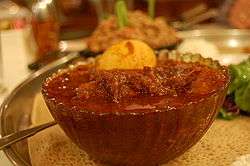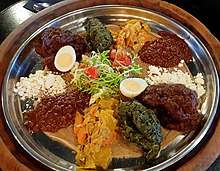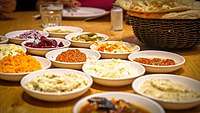Wat (food)
Wat, we̠t’, wot (Amharic: ወጥ, IPA: [wətʼ]) or tsebhi (Tigrinya: ጸብሒ, IPA: [sʼɐbħi]) is an Ethiopian and Eritrean stew or curry that may be prepared with chicken, beef, lamb, a variety of vegetables, spice mixtures such as berbere, and niter kibbeh, a seasoned clarified butter.
 | |
| Alternative names | Tsebhe |
|---|---|
| Type | Stew or curry |
| Place of origin | Ethiopia and Eritrea |
| Main ingredients | Meat (chicken, beef, or lamb), vegetables, niter kibbeh, spices |
Overview

Several properties distinguish wats from stews of other cultures. Perhaps the most obvious is an unusual cooking technique: the preparation of a wat begins with chopped onions slow cooked, without any fat or oil, in a dry skillet or pot until much of their moisture has been driven away. Fat (usually niter kibbeh) is then added, and the onions and other aromatics are sautéed before the addition of other ingredients. This method causes the onions to break down and thicken the stew.
Wat is traditionally eaten with injera, a spongy flat bread made from the millet-like grain known as teff. There are many types of wats. The popular ones are doro wat and siga wat, (Ge'ez: ሥጋ śigā) made with beef.
Doro wat
Doro wat (Amharic: ዶሮ ወጥ dōrō we̠t’, Tigrinya: ደርሆ ጸብሒ derhō tsebhi), made from chicken and sometimes hard-boiled eggs is the most popular traditional food in Ethiopia, often eaten as part of a group who share a communal bowl and basket of injera.[1]
Sanbat Wat
A Jewish version of doro wat is eaten by the Beta Israel (Ethiopian Jews) called "Sanbat Wat" (Sabbath Wat). Sanbat Wat is a traditional Shabbat dish. In order to avoid mixing of meat and dairy, vegetable oil can be used as a parev substitute in lieu of ghee. Yeqimem zeyet, a form of niter kibbeh made from vegetable oil, can also be used.[2]
See also
- List of African dishes
- List of Ethiopian dishes and foods
- List of stews
References
- Levine, Donald N. Wax and Gold: Tradition and Innovation in Ethiopian Culture (Chicago: University Press, 1972), p. 132.
- "Sanbat Wat (Ethiopian Shabbat Stew)". ReformJudaism.org. Retrieved 2019-10-13.
